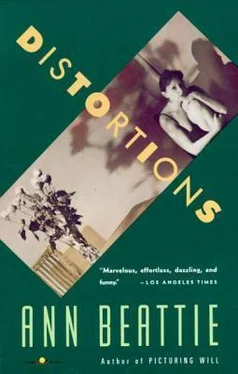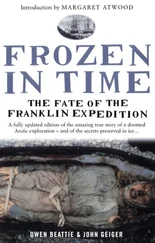Ann Beattie - Distortions
Здесь есть возможность читать онлайн «Ann Beattie - Distortions» весь текст электронной книги совершенно бесплатно (целиком полную версию без сокращений). В некоторых случаях можно слушать аудио, скачать через торрент в формате fb2 и присутствует краткое содержание. Год выпуска: 1991, Издательство: Vintage, Жанр: Современная проза, на английском языке. Описание произведения, (предисловие) а так же отзывы посетителей доступны на портале библиотеки ЛибКат.
- Название:Distortions
- Автор:
- Издательство:Vintage
- Жанр:
- Год:1991
- ISBN:нет данных
- Рейтинг книги:5 / 5. Голосов: 1
-
Избранное:Добавить в избранное
- Отзывы:
-
Ваша оценка:
- 100
- 1
- 2
- 3
- 4
- 5
Distortions: краткое содержание, описание и аннотация
Предлагаем к чтению аннотацию, описание, краткое содержание или предисловие (зависит от того, что написал сам автор книги «Distortions»). Если вы не нашли необходимую информацию о книге — напишите в комментариях, мы постараемся отыскать её.
Distortions — читать онлайн бесплатно полную книгу (весь текст) целиком
Ниже представлен текст книги, разбитый по страницам. Система сохранения места последней прочитанной страницы, позволяет с удобством читать онлайн бесплатно книгу «Distortions», без необходимости каждый раз заново искать на чём Вы остановились. Поставьте закладку, и сможете в любой момент перейти на страницу, на которой закончили чтение.
Интервал:
Закладка:
“I was at your husband’s,” he said.
Was this a joke?
“No. He called when you were teaching. He wanted to ask you about some paper. We started talking about law school. He was disappointed that I’d decided not to go. He asked me to come over.”
Had he been talked into going to law school?
“No. But your husband is a very nice man. He offered to write me a recommendation.”
“Take it!” she said.
“No, it’s not worth the hassle. It’s not worth all those years of study, competing with punks.
What for?” What was there better to do?
“See the country.”
“See the country!” she repeated.
“Get a motorcycle. Go out to the Coast. It’s warm there. I’m sick of the cold.”
There was nothing she could say. She decided that she was like a mother whose son has just told her he wants to design clothes. Couldn’t he do something serious? Couldn’t he be an architect? But she couldn’t say this to him. If he had to go West, couldn’t he at least buy a car? He told her it had to be a motorcycle. He wanted to feel the handlebars get warm as he got farther west. She went into the kitchen and got the box of pastries. On the way back to the living room, she clicked the thermostat up two degrees. They drank coffee and ate the eclairs and little tarts. It was a celebration; he was going to do what he was going to do. She said she would go with him on the weekend to look for a motorcycle.
On Monday he left. Just like that, he was gone. He left all his things in his room. After a few days, she realized that it would be practical to store his things in the attic and use his room for a study, but she couldn’t touch anything. She continued to take care of the room, but not every day. Sometimes when she felt lonely, she would go in there and look at all his books in the bookcase. Other times, she would clean the house thoroughly at night, with a burst of energy, as if to make ready for his return. One night after she cleaned, she took some bottles of beer to put in the refrigerator, so they would be cool when she came home from work. She did not lose her temper any more, but her programs were no longer innovative. Alison’s piano playing guided the Junior Chorus through the world, sad and weary, through the winter and into the spring.
One night, her husband called (he was her ex-husband now). He was still trying to track down the safe-deposit box where his mother had placed her jewelry. Quite a lot of old pieces were there; there were a few diamonds and some good jade. His mother was old; he didn’t want to disturb her, or make her think of dying, and he was embarrassed to let her know he’d misplaced her instructions. She said she would look for the paper and call him back, and he asked if he could come and look with her. She said that would be all right. He came that night, and she offered him a beer. They looked through her file and found nothing. “The paper has to be somewhere,” he said, full of professional assurance. “It has to be somewhere.” She gestured hopelessly at the rooms of the house; it wasn’t in the bathroom or the kitchen or the living room, and it certainly wasn’t in Sam’s room. He asked how Sam was doing, and she told him she hadn’t heard from him. Every day she expected some word from him, but none had come. She didn’t tell him that — just that she hadn’t heard. She drank several beers, as she did every night. They sat together in the living room, drinking beer. She asked if he would like something to eat, and fixed sandwiches. He said he would go, so she could get up in the morning. She gestured at the rooms of the house. He stayed, and slept in her bed.
In the morning, Ellen called the school and said she had a cold. “Everybody is sick,” the switchboard operator told her. “It’s the change in the weather.” She and her husband took a drive and went to a nice restaurant for lunch. After lunch, they went to his house and hunted for the paper. They couldn’t find it. He fixed her dinner, and she stayed at his house that night. In the morning, he dropped her off at school on his way to work.
A girl in Junior Chorus came up to talk to her after class. Shyly, the girl told her she played the piano. Could she also play the piano for the chorus sometime? Alison played very well, the girl said quickly; she didn’t want Alison to stop playing, but could she try sometime, too? She could read music well, and she knew some classics and some Gilbert and Sullivan and a lot of popular songs, too. She mentioned some of them. Ellen watched the girl leave, blushing with nervousness at having spoken to the teacher and proud that she would be allowed to play the piano at the next meeting. She was a tall girl, with brown hair that had been cut too short; her glasses, which were harlequin-shape, looked more like something the girl’s mother would wear. Ellen wondered if Sam had a girlfriend. If the girlfriend had brown hair, did it get tangled in the wind on the motorcycle? Sam would have been proud of her — the way she put the new pianist at ease, feigning interest in the girl’s talent, thanking her for volunteering. The next afternoon, she thought of Sam again. He would have found it funny that the brown-haired girl also chose to play “Swanee River.”
Her husband came to her house after work, and they had dinner. She had a postcard from Sam. She showed it to him — a picture of the Santa Monica Freeway, clogged with cars. The message read, “The small speck between the red and the yellow car is me, doing 110. Love, Sam.” There were no specks between cars, which were themselves only specks in the picture, but Ellen looked and smiled anyway.
The next week there was another postcard — a scowling Indian — which had been mailed to her husband. Sam thanked him for the talk they had before he left. He closed with some advice: “Come West. It’s warm and it’s beautiful. How do you know until you try? Peace, Sam.”
Later that week, while they were on their way to buy groceries, a couple on a motorcycle came out of nowhere and swerved in front of their car, going much too fast.
“Crazy son of a bitch!” her husband said, hitting the brakes.
The girl on the motorcycle looked back, probably to assure herself that they really had got through safely. The girl was smiling. Actually, the girl was too far away for Ellen to see her expression clearly, but she was certain that she saw a smile.
“Crazy son of a bitch,” her husband was saying. Ellen closed her eyes and remembered being in the motorcycle shop with Sam, looking at the machines.
“I want one that will do a hundred with no sweat,” Sam had said to the salesman.
“All of these will do a hundred easy,” the salesman said, smiling at them.
“This one, then,” Sam told him, tapping the handlebars of the one he stood by.
He paid for most of it with cash. She hadn’t taken any rent money from him for a long time, so he had a lot of cash. He wrote a check to cover the rest of it. The salesman was surprised, counting the bills.
“Do you have streamers?” Sam had asked.
“Streamers?”
“Isn’t that what they’re called? The things kids have on their bikes?”
The salesman smiled. “We don’t carry them. Guess you’d have to go to a bicycle shop.”
“I guess I will,” Sam said. “I’ve got to go in style.”
Ellen looked at her husband. How can I be so unsympathetic to him, she wondered. She was angry. She should have asked Sam why she felt that way toward her husband sometimes. He would have explained it all to her, patiently, in a late-night talk. There had been no return address on the postcards. Someday he would send his address, and she could still ask him. She could tell him about the new girl who could have played anything she wanted and who selected “Swanee River.” In the car, with her eyes closed, she smiled, and ahead of them — miles ahead of them now — so did the girl on the motorcycle.
Читать дальшеИнтервал:
Закладка:
Похожие книги на «Distortions»
Представляем Вашему вниманию похожие книги на «Distortions» списком для выбора. Мы отобрали схожую по названию и смыслу литературу в надежде предоставить читателям больше вариантов отыскать новые, интересные, ещё непрочитанные произведения.
Обсуждение, отзывы о книге «Distortions» и просто собственные мнения читателей. Оставьте ваши комментарии, напишите, что Вы думаете о произведении, его смысле или главных героях. Укажите что конкретно понравилось, а что нет, и почему Вы так считаете.












